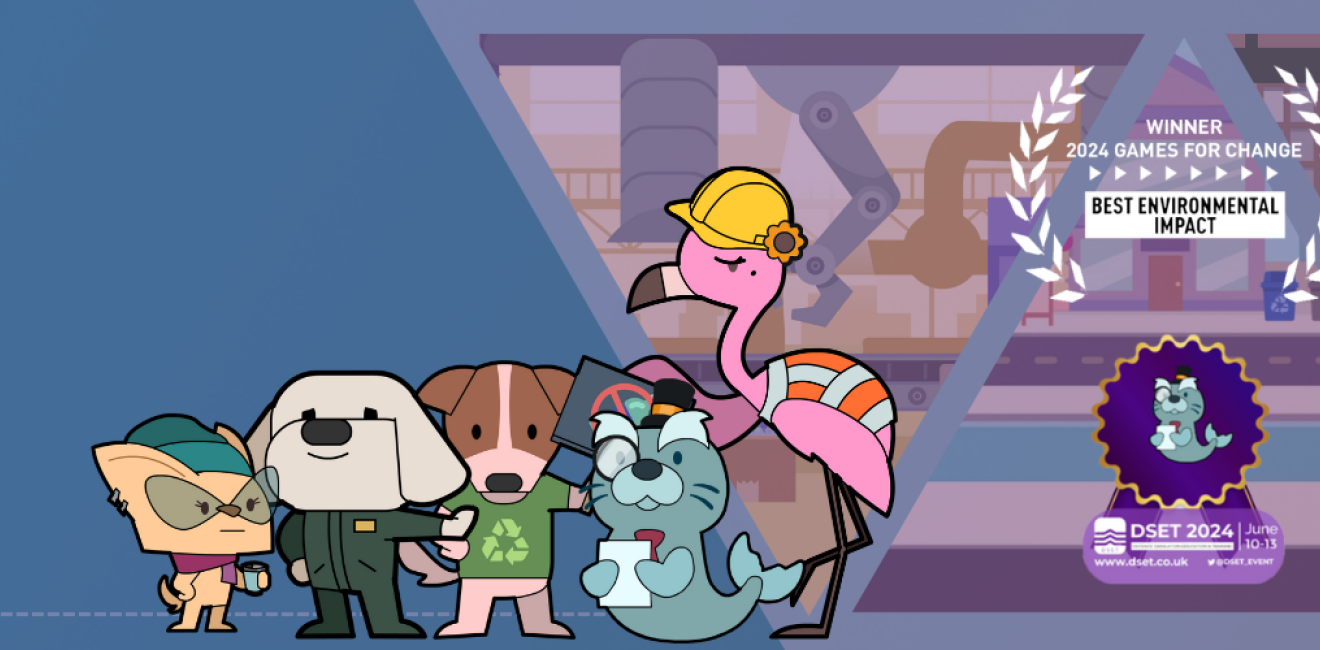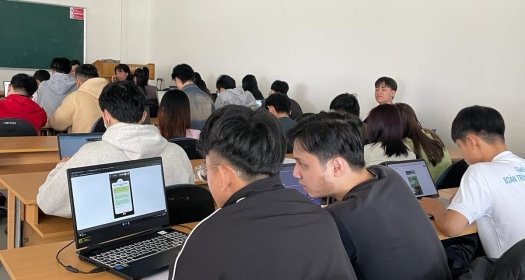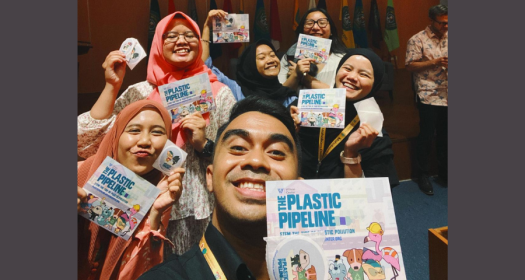
A blog of the Science and Technology Innovation Program
The Woodrow Wilson International Center for Scholars is pleased to announce that The Plastic Pipeline, a serious game produced by the Wilson Center’s Serious Games Initiative and China Environment Forum in collaboration with FableVision Studios, has won two awards this summer.
The Plastic Pipeline brings awareness to single-use plastic pollution and what policies are being considered to address this global crisis. The creation of this game was informed by the ethos of the Serious Games Initiative, to use games to engage the broader public in policy discourse, and the research expertise of the China Environment Forum, whose research focuses on environmental issues in China and neighboring regions. The research and game development for The Plastic Pipeline was partially supported by the National Geographic Foundation, Luce Foundation and Japan Foundation.
About the Awards
The first award, won on June 13, was for Best Game for Government Audiences from the Serious Games Showcase and Competition Europe. This year’s showcase was held at Ashton Gate Stadium in Bristol, UK, from June 10-13, as part of a larger initiative within the Defense Simulation, Education, and Training (DSET) conference. The Serious Games Showcase and Competition Europe is part of a broader community of practice within military and civil society contexts, a branch of the Serious Games Showcase and Competition (SGS&C) held in Orlando, Florida each year. The US-based SGS&C has been held since 2005, and is part of the Interservice/Industry Training, Simulation and Education Conference (I/ITSEC).
The second award, won on June 27, was for the Best Game in Environmental Impact from the Games for Change Festival in New York City. Games for Change has been around for 21 years, starting around the same time as the Serious Games Initiative, as part of a major push to show how games can be used for public good. Since its inception, Games for Change has empowered game creators and innovators to drive real-world change through using games and immersive media that help people learn, improve their communities, and contribute to making the world a better place.
The annual Games for Change Festival brings together change makers who use games from across sectors for a curated program of talks, workshops, and networking opportunities. Games for Change reported that in 2024 over 2000 attendees came to New York City to engage in serious games. The Games for Change Festival also received hundreds of submissions for its game awards this year. There were submissions from 53 countries, with Best Game in Environmental Impact being the newest and most popular category. This award category was built off of a collaboration with the United Nations to support the Sustainable Development Goals.
In a review of the Best in Environmental Impact category by Digital Trends, "The Plastic Pipeline is a bit of a two-for-one lesson. It doesn’t just tell players how they can reduce waste usage in their own lives, but shows the complexities of building sensible laws and environmental programs." Those laws were built off of extensive research done by the China Environment Forum here at the Wilson Center.
Impact & Looking Ahead
“The United States and China are leaders in plastic pollution,” said Dr. Jennifer Turner, director of the China Environment Forum. “We started this project to highlight the global crisis that is destroying the health of our oceans, and as a way to engage US and Asian audiences in policy research.”
“The current discussion around a global treaty for single-use plastics makes the effort to educate audiences with creative tools like The Plastic Pipeline even more crucial, and continues our strong tradition of amplifying the work of environmental and policy experts,” added Turner.
To analyze the impact of The Plastic Pipeline on players’ attitudes towards single-use plastic, environmental impacts, and policy, we conducted a mixed-method design involving both field observation and a pre- and post-survey in the US and Vietnam.
Read moreThe planet is awash in plastic waste, from the plastic bags that litter our oceans to the microplastics seeping into our drinking water and food supply. Browse our research below on how environmental research and action is intersecting with policy.
Learn moreThe Serious Games Initiative drew on two decades of gaming and communication expertise to be the bridge between researchers and players, lowering the barrier of entry for and fostering accessibility to complex policy topics. Plastic pollution, outreach, and education has often focused on teaching consumer-level behavior, like recycling or clean up. But what happens at the policy level in industry and government plays a crucial role in reducing plastic pollution worldwide.
The project started with a workshop in China, headed by Dr. Jennifer Turner and Dr. Elizabeth Newbury, and has now expanded to include participation from across the US, Vietnam and Indonesia. The team has been working with both NGOs on the ground in southeast Asia, US Embassies, and leading research institutions to inform the content and impact research for the game.
“Serious games, games designed not just for entertainment but for impact, are a great tool for engaging, exciting, and motivating audiences of all ages to confront critical topics,” said Dr. Elizabeth Newbury, director of the Serious Games Initiative, while speaking on this global impact.
In order to win the category of Environmental Impact, research needed to be done to understand now just whether the game was enjoyable but also had meaningful impact. In this case, the team was looking to understand if players learned from the game and were more motivated to get involved in environmental policy after playing the game. In game playtesting, which was done in US and Vietnam college classrooms, we received feedback that echoes this belief of games as powerful tools. Many players emphasized that games like The Plastic Pipeline can be valuable in educating and influencing the public. Some of the playtesters mentioned being excited to show the game to their younger siblings at home to encourage them to learn more about the environment.
The Wilson Center will continue to produce more plastic pollution blogs, policy reports, webinars and closed conversations on the plastic treaty and plastic action in China, southeast Asia and the United States. We also will be expanding our work to disseminate our award-winning Plastic Pipeline educational video game.
If you would like to stay engaged in future conversations around plastics please reach out to Jennifer Turner, PhD at jennifer.turner@wilsoncenter.org. To stay engaged with conversations about serious games, in education or beyond, please reach out to Elizabeth M H Newbury, PhD, at Elizabeth.Newbury@wilsoncenter.org or sign up for our email lists below.
Authors





Serious Games Initiative
The Serious Games Initiative communicates science and policy complexities through the world’s most dynamic medium: gaming. Read more


China Environment Forum
China’s global footprint isn’t just an economic one, it’s an environmental one. From BRI investments in Africa and Asia to its growing presence in Latin America, understanding China’s motivations, who stands to gain - and who stands to lose - is critical to informing smart US foreign policy. Read more


Science and Technology Innovation Program
The Science and Technology Innovation Program (STIP) serves as the bridge between technologists, policymakers, industry, and global stakeholders. Read more







